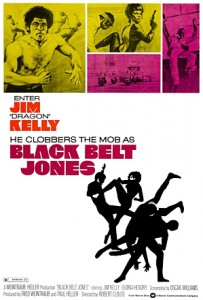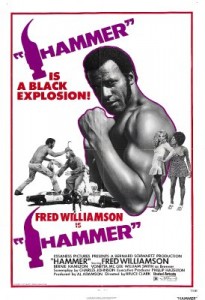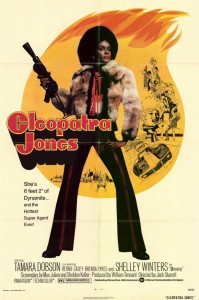
After all the debates, controversies, and stereotype accusations have cleared, looking back on Blaxploitation cinema today it’s easy to see healthy portions of the crime and action genres. Using these genres and the struggles of the black community, these films were created for those that wanted to see African American characters on the big screen not taking shit from the man, “getting over”, and–above all else—being the heroes in movies. In the documentary Baad Asssss Cinema, Samuel L. Jackson gives his take on the heroes of Blaxploitation: “We were tired of seeing the righteous black man. And all of a sudden we had guys who were…us. Or guys who did the things we wanted those guys to do.”
The unsung supporting players in these films that backed Fred Williamson and Pam Grier and many other stars were people acting and making a living off of it. Regulars such as Thalmus Rasulala, D’Urville Martin, Julius Harris, Tony King, Gloria Hendry, Vonetta McGee, Charles McGregor, Richard Lawson, and many other stars like Carl Weathers, Paul Winfield, Bernie Casey, and Robert DoQui went on to have fruitful careers.
Here are the greatest Blaxploitation crime and actions films:
Written by Alvin L. Fast & Graydon Clark
Directed by Graydon Clark
“Tell Mr. Jonathan that I left. If he won’t do me no body will.”
Sleazy, lurid, cheap, and violent, Black Shampoo hits all the right notes of pure exploitation cinema. John Daniels stars as Mr. Johnathan, a hairstylist that goes from love machine to killing machine when forced to save his girlfriend from the mob. Gratuitous sex fills screen time until Mr. Jonathan slices his way through mobsters with a chainsaw in the finale ensuring you’ve got your dollars worth of sex and violence.
Written by Oscar Williams, Fred Weintraub, & Alexandra Rose
Directed by Robert Clouse
“If you don’t have no teeth, you ain’t get no cavities.”
Fresh from his supporting role in Enter the Dragon, Jim Kelly gets his starring turn in this comedic, kung-fu extravaganza as badass Black Belt Jones. Black Belt (yes that’s his name) chops and kicks his way through the mob and the hustlers trying to move in on his friends at the Black Byrd karate school. Supported by Scatman Crothers, Gloria Hendry, and Dennis Coffey’s slick score, Black Belt Jones is the high mark of Blaxploitation kung-fu films, followed by such films as Hot Potato, Black Fist, and The Tattoo Connection.
Written for the screen & directed by Barry Pollack
“Man I offer you the biggest deal since Columbus hustled that broad Isabella and all you do is bullshit.”
Based on W.R. Burnett’s crime novel Asphalt Jungle, this film takes none of the previous established noir elements from John Huston’s adaptation in 1950. Instead, each character has been modernly reinvented. Set to Solomon Burke’s stinging score, Thalmus Rasulala leads a team of schemers and double-crossers through the planning, execution, and aftermath of a heist, making this one of the few heist films in Blaxploitation cinema.
17. Three the Hard Way, 1974
Written by Eric Bercovici & Jerrold L. Ludwig
Directed by Gordon Parks, Jr.
“You know man…you come to town…I know there’s gonna be trouble.”
Jim Brown, Fred Williamson, and Jim Kelly star as a black-style A-Team as they square off against a group of powerful white supremacists. Each action star plays to his strengths, Brown the level-headed leader; Williamson the suave, street-smart hustler; and Kelly the disciplined kung-fu master. Plenty of Peckinpah-inspired editing and shoot-outs follow as the team gives it to the evil racists. The film’s most memorable scene however, is an erotically charged torture scene featuring three topless assassins getting answers out of a white supremacist. The assassins arrive in colored jump-suits, helmets, and motorcycles obviously influencing such films as Kill Bill.
Written by Charles Eric Johnson
Directed by Bruce D. Clark
“The toughest fighter, the heaviest mob, and no prize money for the loser.”
This is Fred “The Hammer” Williamson’s first tailored starring vehicle. B.J. Hammer is a dock worker that rises to the top as a prizefighter. Forced into a conflict with the mob, Hammer finds himself in a moral dilemma: do the right thing or let his ambition rule him. Full of car chases, gun play, and boxing matches Williamson handles himself with the bravado and swagger unparalleled in cinema.
Written by Orville H. Hampton
Directed by Arthur Macks
“Trouble? When you’ve got the biggest rip-off of the decade in the murder capital of the world, you’ve got more than trouble. You’ve got disaster.”
This police drama is set within the racial turmoil of early 1970s Detroit. A black detective is paired with a white detective to crack the case of a heist on a black politician. Filmed on the cold streets of post-riot Detroit, this film takes a lot of influence from Across 110th Street released just a year earlier. More intricately plotted than most Blaxploitation films, but the social messages never waiver. The burning question of the film is: are the criminals black or white? The film takes a strong stance delivering a message that a criminal is a criminal no matter their race.
 14. Slaughter’s Big Rip-Off, 1973
14. Slaughter’s Big Rip-Off, 1973
Written by Charles Eric Johnson
Directed by Gordon Douglas
“I’m Slaughter, baby. The baddest cat to ever walk the Earth.”
Jim Brown’s Slaughter may be his best starring role. After killing just about everyone in Slaughter, the leftover gangsters led by Ed McMahon are looking for revenge. The film’s most memorable scene features Slaughter threatening to stick a redneck’s head into a plane propeller to get his answers. With Don Stroud’s Kirk as one of the nastiest gangsters in cinema and scored by James Brown, Slaughter’s Big Rip-Off is tough-guy cinema gold.
Written and Directed by Larry Cohen
“I’m gonna make you famous Di Angelo! You’re gonna be the first whitey to be hung by a nigger!”
Filmed on weekends between Williamson’s That Man Bolt and Cohen’s It’s Alive, this sequel to Black Caesar prioritizes action over the social commentary of the first film. Explosions, fights in a coal plant, and plenty of great physicality from Williamson showcases the man’s determination to be an all-out movie star. Larry Cohen directs at the speed of a bullet, balancing two films and two locations (New York and L.A.)–a testament to his stamina and creativity. His DVD commentaries to both this film and Black Caesar are encyclopedias of knowledge about guerrilla and independent filmmaking.
Written by Robert Hartford-Davis, Robert Shearer, and Franklin Coen
Directed by Robert Hartford-Davis
“Come on folks have a good time, just an invasion from across the tracks.”
After his brother rips off the mob, nightclub owner Gunn must face down the mob in this revenge-action film. Martin Landau and Bruce Glover star as a couple of very nasty gangsters. Hot off of Slaughter, Jim Brown continues to solidify his tough guy image as he punches and shoots his way through the mob. He even throws a man down a bowling lane. Supported by the always cool Bernie Casey, Black Gunn is a fun and funky action flick.
Written for the screen and directed by George Armitage
“You got the taste of blood, huh, animal?”
Based on Ted Lewis’s novel Jack’s Return Home, this film is, at it’s core, a remake of Get Carter. Grimier and nastier, Bernie Casey’s Tackett kicks ass and blasts his way to the truth behind his brother’s death. He is less-humanistic and less-sympathetic than Michael Caine’s Carter, even going as far as to take out the entire mob along the way.
Written by Bob Ellison
Directed by Arthur Macks
“Well let me tell you something about people, big shot. Whether they’re white, black, green, yellow, or purple, when they smell a few dollars they all act alike.”
Another solid action film from Fred Williamson who stars as Duke Johnson, a man being shaken down by white law enforcement. He enlists friends to help him overthrow the white power of Bucktown, but soon finds his friends have a power play of their own. Williamson is never one to shy away from the physicality needed in his action roles and this film is no exception. The climax has him and Thalmus Rasulala crashing into everything possible as they duke it out. Co-starring Carl Weathers as a heavy Hambone and Pam Grier in a role that is well beneath her acting abilities, Bucktown plays out like so many average action films, but is saved by Williamson’s star power.
Written by Max Julien, and Sheldon Keller
Directed by Jack Starrett
“If I ever hear you sellin’ so much as a cough drop, I’m comin’ down on you so hard.”
This kung-fu, action adventure from Jack Starrett (Slaughter) and Max Julien (The Mack) stars Tamara Dobsen kicking all kinds of ass as secret agent Cleopatra Jones, the closest character to the black equivalent to James Bond. She squares off against power-hungry mob boss Mommy, devilishly played by Shelley Winters. Featuring some of Blaxploitation’s greatest action scenes – mostly involving the car chase through the paved LA river and a finale in a junk yard.
Written by Nicola Badalucco, Luciano Vincenzoni, and Georges Dutter
Directed by Duccio Tessari
“The priest and the ex-cop are the toughest super team in town. Yeah, tough guys, Isaac Hayes is the ex-cop who’s got some heavy scores to settle. Lino Ventura is the priest who is an expert at confession. Fred Williamson is Brother Snake. And he’s killing anything that moves for a million in cash.”
Isaac Hayes arrives on the scene of Blaxploitation with both his first starring role and another solid film score. Fred Williamson, surprisingly playing the antagonist, fits perfectly as a man hell-bent on obtaining a fortune. Mixes the buddy-cop genre, gangster picture, and action film, Hayes’s ex-cop Lee teams with Father Charlie to bring down Brother Snake. Hayes’s score has outlived the film, being readily available unlike the film itself. Both the title track and “Run, Fay, Run” stand out on the album.
Written by Mark Hanna and Don Williams
Directed by Jack Starrett
“I hope you’re better with that knife than you are with that big black car…’cause I’m gonna jam it up you ass.”
Kicking off with one of Billy Preston’s great singles, the title track to Slaughter is one of the highest moments of bad ass cinema, establishing Slaughter to be a character not to be fucked with even before the audience meets him. Jim Brown’s greatest action hero rivals any character Stallone or Schwarzenegger could muster. He’s big, intimidating, and when he takes his shirt off just before a knife fight the audience knows it is on! The film’s highest point occurs during the film’s climax in which Jim Brown steps out of a moving vehicle and mows down henchmen with a machine gun. No stunt-double and no trick editing, Brown is truly bad ass.
 6. Cotton Comes to Harlem, 1970
6. Cotton Comes to Harlem, 1970
Written for the screen by Ossie Davis and Arnold Perl
Directed by Ossie Davis
“I understand those two, alright. Too quick with their fists. Too flip with their talk. Too fast with their guns. And two damn black maniacs on a powder keg.”
Based on Chester Himes’s novel, Ossie Davis’s directorial debut is an action-comedy, filled with some of the greatest black comedians and black actors of the 1970s. The car chase kicking off the action of the film shows just how skilled Davis is behind the camera. Set in both the seedy underworld of Harlem, mixing in religious hopes and the financial struggles of the black community, Cotton Comes to Harlem predates Sweet Sweetback’s Baadasssss Song as the first Blaxploitation film.
Written by John D.F. Black
Directed by Ivan Dixon
“Now get out, the two of you are fuckin’ up a nice day.”
Mr. T is a private investigator, man of the community, and all-around bad motherfucker. Structured like a cross between classic film noir and Yojimbo, Mr. T is stuck in the middle of a gang war and the police. Marvin Gaye’s jazz-tinged score supports the film’s film noir influences as Mr. T moves through the picture with echoes of Richard Stark’s Parker. The great Paul Winfield rounds out the cast as a cowering pimp, but it’s Robert Hooks’s performance that rivals Richard Roundtree’s Shaft or Fred Williamson’s Tommy Gibbs as the contender of the baddest motherfucker in the land, and he has gone on to enjoy a long career in film and television.
Written by Howard Friedlander and Ed Spielman
Directed by Ossie Davis
“I tell ya Gordon, it’d take an army to get the dope outta Harlem.”
Ossie Davis’s masterpiece of revenge cinema goes well beyond the confines of Blaxploitation. The film encompasses themes dealing with a post-Vietnam America, the war against drugs, the economic struggles of the black community, and the consequences of vigilantism. Paul Winfield stars as Gordon, a man returning from Vietnam to find his wife has died from a drug related death. He vows to clean up the streets of Harlem, and he and his friends beat, hustle, and kill their way up the drug latter to the top. This film, a rare find now, deserves to stand alongside the likes of Death Wish, The French Connection, and Taxi Driver for it’s depiction of 1970s New York, tight pacing, brutal action, and crisp dialogue. Davis’s film is energetic, stark, and has the muscle to stand the test of time.
Written and Directed by Larry Cohen
“Now…take a look at Harlem. Tell me…who’s gonna control these people?”
Fresh off his starring role in Hammer, Fred Williamson solidifies his star power with this black take on the classic Warner Bros gangster picture. After serving eight years in prison, Tommy Gibbs is out to take his piece of New York City and Harlem is his prize. A story of the rise and fall of a gangster up to this point had never been as cool as when Williamson struts down the street to James Brown’s “The Boss”. In this morality tale, Gibbs is a man so driven to escape the poverty of his childhood–the same poverty that ruined his parents—that he’ll do anything no matter the consequences to make it big only to find the top lonely and unforgiving. And ultimately poverty comes back to claim Gibbs.
Written by Oscar Williams & Michael Allin and Jerry Wilkes
Directed by Jonathan Kaplan
“Anybody ask you what happened, tell ’em you been hit by a truck: Mac ‘Truck’ Turner! “
Isaac Hayes is one of the meanest, toughest anti-heroes to grace the screen as ex-football star turned bounty hunter, Truck Turner. After having no choice but to kill a pimp, Turner is the hunted by the scum of the underworld as a price is put on his head for revenge. Co-starring the always great Yaphet Kotto and a very villainous vixen in Star Trek’s Nichelle Nichols, Truck Turner boasts one of Blaxploitation’s and crime cinema’s highest body counts. Hayes is not only capable of holding the picture on his acting shoulders, he also scored it.
Written by Ernest Tidyman and John D.F. Black
Directed by Gordon Parks
“I just said up yours baby.”
Based on Ernest Tidyman’s novel, Shaft along with Sweet Sweetback’s Baadasssss Song kicked off the craze of Blaxploitation cinema in the 1970s. Richard Roundtree stars as John Shaft a private investigator that is cool, street-smart, sexual, and an action hero. Shaft opens in the cold streets of New York City set to the rat-a-tat title track of Isaac Hayes’s score. Hayes wrote some of the greatest scores of Blaxploitation cinema, which earned him an Oscar as the first African American to win a best song Academy Award. Tracks such as the title theme and “Soulsville” are not only great film scores but stand as a testament to Hayes song writing. Right from the start John Shaft’s tough attitude is apparent as he gives a cabbie the finger and shouts “Up yours!” He takes no shit off of anyone be it police officers, members of black power organizations, gangsters, or crime lords. He shrugs everyone off equally. Shaft‘s exciting climax builds at the pace of a Leone gunfight. Shaft bides his time, plans, and in a flash he’s killed the bad guys and saved the girl. Shaft is the character that set the tone for the Blaxploitation hero or anti-hero. Cool, jive talking, and level-headed at all times. And at the end of the day, no one has gotten over on him and he’s super cool.



















